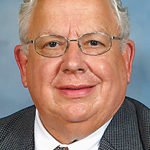 By David Pitt, PhD
By David Pitt, PhD
Eucharistic Revival Column

From the earliest days of the Church, Christians have been thinking about the second coming of Christ. They expected Christ’s return within weeks, perhaps months, of his resurrection. A few years, if necessary. They expected the triumphant return of the Son of Man within their lifetime.
“Amen, I say to you,” Jesus said, “there are some standing here who will not taste death until they see that the kingdom of God has come in power” (Mark 9:1; see also Matt 16:26 and Luke 9:27).
A first-century Christian text, the Didache, represents well the Christian attitude towards the end times in concluding a Eucharistic Prayer with these phrases: “May grace come, and may this world pass away. Amen. Hosanna to the Son of David. If anyone is holy, let him come; if anyone is not, let him repent. Marana tha. Amen.”
Marana tha, a term in the language that Jesus spoke, Aramaic, means both “Come, Lord!” and “May the Lord come!” When, in the Lord’s Prayer, the early Christians petitioned “thy kingdom come,” they meant it! To the rest of the world they may have seemed like the cartoonish characters with long beards, wearing robes and carrying picket signs proclaiming, “The end is near!” No doubt, they saw themselves more like the team on the brink of winning the championship, with only a few seconds remaining in the title game. God’s final victory, won through the death, resurrection and ascension of Christ and sealed in the gift of the Holy Spirit, was imminent. Marana tha.
As they waited, they continued to practice the kingdom of God. The very kingdom that they had seen Jesus live out in word and action during his life. The life that filled the hungry “with good things” while sending the rich “away empty.” The life that threatened to throw down “the rulers from their thrones but [lift] up the lowly” (Luke 1:52-53). The life that had Jesus proclaimed as king, both with the waving of palms while the crowd cheered him and with his cry of a psalm while the crowds mocked him. The kingdom life that resulted in Jesus’ death.
The disciples on the road to Emmaus may not have understood the theological significance of Jesus’ teachings, but they understood well enough that being a Christian required them to invite the stranger to dinner. Even the stranger who had just before called these disciples foolish and “slow of heart” (Luke 24:25). The disciples understood that their living was practicing the imminent kingdom of God. Concern for the stranger and concern for the community alike, all was done in the certain hope that the Lord would come. Marana tha.
Christ did not return imminently and end times fatigue set in. The euphoric common ownership of property described in Acts, where “there was no needy person among them, for those who owned property or houses would sell them, bring the proceeds of the sale, and put them at the feet of the apostles and they were distributed to each according to need” (Acts 4:34-35), did not last. As the Church at Corinth gathered, for example, clear divisions existed among them. “One goes hungry,” Paul chastised, “while another gets drunk” (1 Cor. 11:21). This decline is understandable. We can be on our best behavior, the people we want to be, for an afternoon family reunion. However, when the gathering is longer — much longer — our old habits can kick in. While the Corinthians thought that they were celebrating the Eucharist, Paul insists they were not. At the Eucharist, he argues, the faithful ought not practice the virtues of the world. Instead, they should practice the kingdom of God that they await. In so doing they “proclaim the death of the Lord until he comes” (1 Cor. 11:26). Here is Paul’s basic argument: to eat worthily the body of Christ, they need to discern the body of Christ among themselves; in order to discern the body of Christ, they need to try to behave like the body of Christ. Marana tha.
Fast-forward 2,000 years. Yes, we still pray “thy kingdom come,” but let’s be honest, not many are really expecting the long-expected Jesus to arrive tomorrow. We seem to have taken the claim in 2 Peter to heart — “with the Lord one day is like a thousand years” (3:8a). The cartoonish “The End is Near” picketer is more punchline than prophecy. Rather than being on the winning side in the last moments of the championship game, it feels much more like being mid-season, where there are plenty of games and plenty of practices to go.
We should be reminded, as 2 Peter continues, “that with the Lord … a thousand years [is] like one day. The Lord does not delay his promise as some regard ‘delay,’ but he is patient with you, not wishing that any should perish but that all should come to repentance” (2 Peter 3:8b-9). As much as this might seem like philosophical double-speak, it suggests that while Christ is coming at the end of time, Christ is also coming now. We know this to be true.
As the Constitution on the Liturgy clarifies, Christ comes into our midst in and through the transformation of ordinary bread and wine. Christ comes into our midst in and through the proclamation and preaching of the word. Christ comes into our midst in and through the ordained presider of our liturgical assemblies. Christ comes into our midst in and through the gathered assembly that prays and sings (SC 7). Christ is with us. Christ still sends us out to follow up on our intercession: “Thy kingdom come, thy will be done on earth as it is in heaven.” Marana tha.
(David Pitt, Ph.D., is associate professor of Theology at Loras College in Dubuque, Iowa.)











